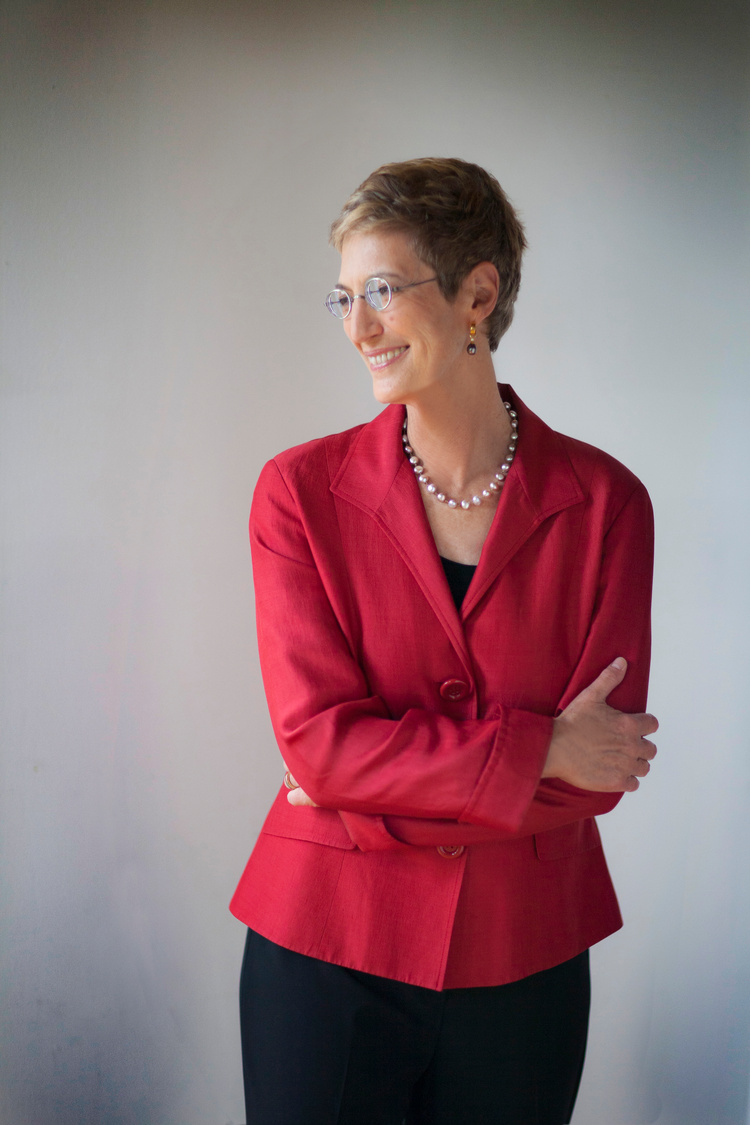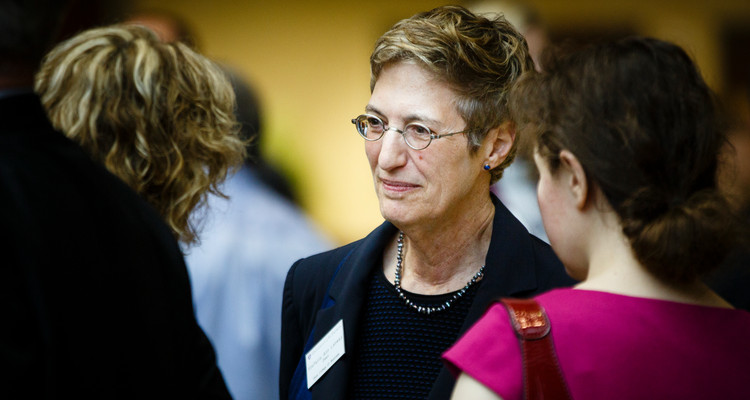Since the College of Business officially was established in 2001, and its first dean named in 2002, it has had a singular focus: to bring its academic offerings on par with leading business schools across the nation in order to earn accreditation by the Association to Advance Collegiate Schools of Business International (AACSB). As dean, Christopher Puto, Ph.D., along with a team of associate deans, faculty, staff and advisers, worked tirelessly to ensure that continuous improvement characterized the college’s degree programs, its faculty roster, its support services and the quality of the education students receive.
Within a decade, the Full-time UST MBA program was launched, the Schulze School of Entrepreneurship received a naming gift and opened, the undergraduate business program and the Evening UST MBA curricula were refined, specialized master's programs in real estate and accountancy were added to the portfolio, and more than 50 tenure-track, full-time faculty were hired to bring academic rigor to the classrooms. As a result, the college was accredited by AACSB in 2010, two years ahead of schedule; it was subsequently ranked 104th in 2011 and most recently 100th by U.S. News & World Report among more than 600 U.S. schools of business; and perhaps more importantly, the college developed an assurance of learning protocol, a system by which the faculty determine whether students in its classrooms are acquiring the knowledge, skills and tools key to each program.
Perhaps few outside the world of higher education can grasp fully the herculean effort these accomplishments required. This was a slow, often plodding, process much like renovating a building. And, just like a renovation project, the importance of the minutiae and their eventual impact on the endproduct often is lost to those on the outside. It’s not until the last tile is put in place and the last drawer pull installed that it all comes together and is ready to be shown to the public.
And so it is with the Opus College of Business, led by a new dean, Stefanie Lenway, Ph.D., with a new focus on inviting the Minnesota business community to be part of its new look.

Stefanie Lenway (Photo by Judy Olausen)
Knowledge exchange
As a member of the AACSB board of directors as well as a peer review team member and mentor, Lenway is well versed in accreditation. In addition, she is a member of an AACSB task force, AACSB 2020, which is developing a global strategy for the organization that will help network business schools in developed countries with their counterparts in developing countries and promote knowledge exchange to benefit all participants.
This emphasis on knowledge exchange is not a new pursuit for Lenway. As she described in the August 2014 Opus Magnum blog, she reached a turning point in her academic career when she “became fascinated with a group of struggling U.S. companies working to commercialize various new flat-display technologies that would disrupt the television and computer industries and lead to the proliferation of flat panel displays … that ultimately became the standard for the display found today in high-definition televisions and all kinds of computers.”
What began as scholarly research led to what was then a unique collaboration between academics and industry, and to Lenway’s ongoing practice of learning from beyond the walls of academia to prepare students for their careers and better serve the needs of business.
Disrupting the paradigm
Lenway assumes leadership of the college at an inflection point. For 10 years, faculty and staff have been focused on the internal mechanics of building a top-ranked business school. At the same time, however, the world of graduate business education has changed dramatically. The Great Recession of 2007-2008 devastated the global economy and led to U.S. unemployment rates hovering around 10 percent. While previous recessions have led to an increase in graduate-level enrollments, this recession lasted so long it reduced U.S. personal savings to a point where the investment in degrees such as an M.B.A. was hard for many to justify. And, finally, the exponential growth in online programs, including national players, has changed the way education can be delivered.
It is this latter that Lenway sees as an opportunity for business education. “Online teaching will make it difficult for mediocre lecturers to find an audience as students gravitate toward high-quality, entertaining faculty.” By investing in training faculty in best-in-practice technologies and delivery systems, Lenway plans to ensure that students get the most from any online components, while also promising that time in a physical classroom will be interactive and hands on.
Click to Read Lenway's CV
Stefanie Ann Lenway
Education
Ph.D., business administration
Haas School of Business, University of California at Berkeley
M.B.A.
Haas School of Business, University of California at Berkeley
M.A., political science
University of California at Los Angeles
B.A., politics
Merrill College, University of California at Santa Cruz
Work Experience
2010-2014
The Eli and Edythe L. Broad Dean
The Eli Broad College of Business, Michigan State University
2005-2010
Dean, College of Business Administration
University of Illinois at Chicago
2002-2005
Associate dean, MBA Programs and General Mills Professor of Strategic Management
Carlson School of Management, University of Minnesota
2001-2002
Chair, Department of Strategic Management and Organization
Carlson School of Management, University of Minnesota
1996-2001
Professor, Strategic Management and Organization
Carlson School of Management, University of Minnesota
1990-1996
Associate professor of Strategic Management and Organization
Carlson School of Management, University of Minnesota
1984 to 1990
Assistant professor of Strategic Management and Organization
Carlson School of Management, University of Minnesota
1981-1984
Assistant professor of Business and Public Policy
Washington University, St. Louis
“Traditional universities are still experimenting when it comes to online education,” Lenway notes. Harvard is perhaps one of the best-known innovators among traditional universities, launching HBX, a digital learning initiative, earlier this year. The platform delivers business-focused courses, including HBX CORe, an introduction to the fundamentals of business. For UST’s Opus College of Business, the experimentation resulted in the launch of a blended option for its Evening UST MBA program in 2013. Lenway, despite – or because of – her affinity for incorporating technological advances into her work, does not believe that online education will displace face-to-face education altogether, especially in universities noted for their holistic approach to education, such as St. Thomas.
Collaborate, collaborate, collaborate
As a leader in corporate strategy for business education, Lenway is adept at driving institutional change, but change moderated by a strategic imperative to link education with the needs of the real world. In each of her leadership roles – dean of the business school at the University of Illinois at Chicago and at Michigan State University – she has developed partnerships and collaborations with industry. Her work at St. Thomas will be no different.
“The IBM SMART (Statistics and Mining in Academic Research and Training) program at Michigan State University is one example of a highly effective partnership between a university and a corporate entity. In that program, IBM partnered with MSU’s master of business analytics program to give its students experience in analyzing large sets of data and, just as importantly, presenting those results to corporate executives. What made this program so successful – and so unique – was that IBM actually sent their staff to work with our students,” Lenway said.
While many business schools have similar programs for MBA students (the Full-time UST MBA program includes a required Applied Business Research course, for example), the IBM SMART program stands out as an academic program that provided true collaboration between students and executives. Lenway sees an opportunity to expand the ABR program at St. Thomas to more broadly engage companies in Minneapolis and St. Paul. And how does she plan to do this? By spending as little time as possible in her office … at least initially.
“We need to engage in an open and ongoing conversation with companies. I’m not going to be able to have those conversations on campus. I need to go where they are,” she said. In Lenway’s analysis, business schools need to stay on top of the way career paths are changing as innovations in technology, especially, impact the way we all do our work. New skills are needed, old skills need to adapt, and as-yet-unknown skills will continue to emerge as business changes.
Educating the next generation
For more than 100 years, St. Thomas has been linked with business, established, in fact, to educate the sons (and now daughters) of Minnesota. Yet the sons and daughters those early founders sought to educate have changed, especially if we consider the demographics of the millennial generation.
Millennials, according to a 2014 Pew Center report, “are the most racially diverse generation in American history, a trend driven by the large wave of Hispanic and Asian immigrants who have been coming to the U.S. for the past half century, and whose U.S.-born children now are aging into adulthood. In this realm, millennials are a transitional generation. Some 43 percent of millennial adults are non-white, the highest share of any generation.” The report goes on to note that half of children born in the United States today are non-white and the Census Bureau predicts that the U.S. population will be majority nonwhite by about 2043.
For Lenway, this changing demographic is further proof that business schools must be prepared to act as a reliable conduit for diverse and prepared talent. Yet the millennials are not only impacting business at an operational level, they are changing the very definition of “success.” In 2014, the youngest of the baby boomers will turn 50 while the oldest of the millennials is approaching 35. As the now – ironically – more traditional boomers leave the workforce, they leave in their wake what some have called a “void” in leadership. And the millennials show no signs of rushing to fill that void, at least not in the traditional manner.
Lenway sees among this cohort an opportunity for the greatest generation of entrepreneurial activity we have seen since the early part of the last century, a boom in small-business generation characterized by an emphasis on social ventures. Whereas “start-ups” such as Ford Motor Co., 3M, Apple or Microsoft were focused on the bottom line, millennials share a common characteristic: to feel what they are doing is important and makes a difference.
“Business schools wishing to remain relevant will need to provide opportunities for students from all disciplines – not just business – to launch their own companies,” Lenway said. “And these opportunities must support students’ enthusiasm to create social ventures.” She sees strong support for these opportunities at St. Thomas, and notes that the university’s emphasis on entrepreneurship through the Lemonade Stand Project, the Schulze School of Entrepreneurship, the William C. Norris Institute and the Fowler Business Concept Challenge was fundamental to her decision to accept the dean’s position at the college.
Good bones
“Dean Puto has assembled an excellent and engaged faculty interested in real business problems,” Lenway said. “He has built exceptional strengths in ethics, entrepreneurship and the business of health care.” These good bones provide the foundation for Lenway’s goals of expanding the college’s reputation beyond entrepreneurship and innovation.
“When it comes to helping our graduate business students explore the ethical implications of their leadership decisions, I believe we have few equals. Our business ethics faculty is among the largest in the country, and we ‘teach’ ethics in every course. As the former dean often noted, our focus is on helping students understand that profit is the reward for being a good business … not the goal.”
In Minnesota, especially, the health care industry contributes substantially to revenue and job growth. Of the top 20 Minnesota employers, three – UnitedHealth Group, Medtronic and St. Jude Medical – are associated with the health care industry. Lenway plans to ensure that the Health Care UST MBA continues to serve the needs of both employer and employee, expanding the college’s ability to customize its degree programs to meet the unique needs of this industry, as it has done with three cohorts of UnitedHealth Group employees.
Just three months into the job, it is, perhaps, too early for Lenway to have developed a strategy for achieving each of her goals. Yet her history of driving change based on the real needs of both students and industry serves as a clear indicator of what the college and its stakeholders can expect in the coming months. What they also can expect is a dean who will be an active member of the community she serves. “So far, I am working on meeting as many people as possible in the university and the Twin Cities business community. I am also working with my team to look at how we can become more effective in shaping our portfolio to be reflective of and responsive to the needs of our community,” Lenway said.
It’s a good start.
Read more from B. Magazine







